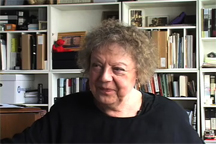 Internationally acclaimed multi-disciplinary artist Vera Frenkel is a dedicated artistic innovator and advocate of the arts. Starting as a printmaker and poet, she is now renowned for her video, installation and new media works. Frenkel is an active participant in the Toronto and Canadian arts community, well respected for her contribution to creative dialogues and her sensitive understanding of the obligations of art to community and cultural knowledge. While Frenkel has worked extensively abroad, she explains in the Visible City interview that these other cities are the “affairs,” but Toronto is the “long term relationship.”
Internationally acclaimed multi-disciplinary artist Vera Frenkel is a dedicated artistic innovator and advocate of the arts. Starting as a printmaker and poet, she is now renowned for her video, installation and new media works. Frenkel is an active participant in the Toronto and Canadian arts community, well respected for her contribution to creative dialogues and her sensitive understanding of the obligations of art to community and cultural knowledge. While Frenkel has worked extensively abroad, she explains in the Visible City interview that these other cities are the “affairs,” but Toronto is the “long term relationship.”
Frenkel’s commitment to an expanded field of creative experimentation is clear from early works such as String Games: Improvisations for Inter-City Video (1974). In this prescient work, artists played a version of the game cat’s cradle between Toronto and Montreal by teleconference. This piece contrasted ritualistic interaction with the new rhythms of translocal communication and embraced the possibilities of communications technologies, foreshadowing new media practices in the decades to come. Later works such as from the Transit Bar (1992), commissioned for documenta IX, continue to think through spatial stories. This functioning piano bar and multi-lingual, multi-screen video piece created a transient community and intricate testimony to contemporary experiences of migration, identification and displacement.
By pushing and playing with art’s communicative potential, Frenkel’s works often live in more than one dimension. For example, Body Missing (1994+), a multi-faceted investigation of Nazi art theft, started as a multimedia installation piece which developed into a collaborative internet work. A poignant dissection of narratives of loss, the nature of evidence and the spectre of genocide in culture, Body Missing was adapted to show at the Freud Museum, London in 2003, and became the focus of a two-day symposium at the Institute of Contemporary Arts. Her most recent large-scale project, The Institute™: Or, What We Do for Love (2003+) – another installation and web-based work – further develops virtual spaces and interactive components to establish a touching yet slyly cutting portrait of the bureaucratization of artists, arts and cultural values. A recipient of numerous awards and distinctions (most recently the Governor General’s Award in Visual and Media Arts), Frenkel has been included in prestigious exhibitions such as documenta and the Venice Biennale, and shown at the Offenes Kulturhaus (Linz, Austria, the Setagaya Museum (Tokyo), the National Gallery of Canada, and MoMA. A professor for many years at York University, she has also been artist-in-residence at the Slade School of Art, the Academy of Fine Arts (Vienna), the Art Institute of Chicago, Minneapolis College of Art and Design, Newcastle Polytechnic, the Royal University (Stockholm), and the Banff Centre for the Arts. She has published widely in art journals such as Canadian Art, Descant, FUSE, Intermédialités, Public and Vanguard. A detailed DVD/CD-ROM set on her work (Of Memory and Displacement/Vera Frenkel: Collected Works) is now available.
(1994+), a multi-faceted investigation of Nazi art theft, started as a multimedia installation piece which developed into a collaborative internet work. A poignant dissection of narratives of loss, the nature of evidence and the spectre of genocide in culture, Body Missing was adapted to show at the Freud Museum, London in 2003, and became the focus of a two-day symposium at the Institute of Contemporary Arts. Her most recent large-scale project,
In these interview clips, Frenkel’s discussion moves between her individual practices and thematic concerns as well as important, abiding issues within contemporary practices on the whole. She addresses specific experiences in Toronto as a practicing artist while at the same time provides insights into the politics of contemporary dwelling and the responsibility of artists.
- Saara Liinamaa
Interview with Vera Frenkel
 |
 |
 |
 |
 |

